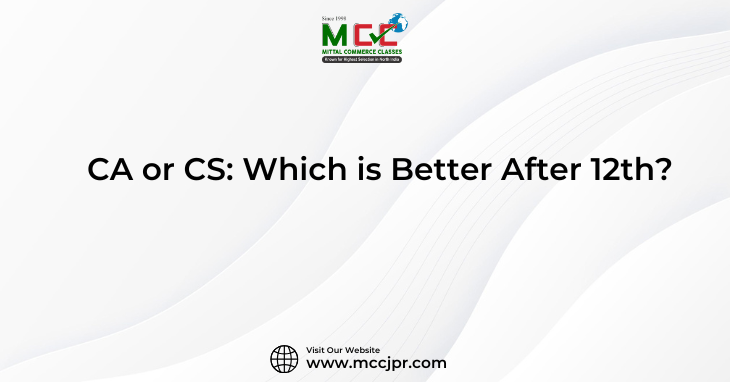The choice between becoming a chartered accountant (CA) or company secretary (CS) depends on your interests, career goals, and strengths. These two professions offer different career paths and areas of expertise. CA’s specialize in financial accounting, auditing, taxation, and financial management, while CS’s focus on corporate governance, legal compliance, and secretarial work in organizations.
The skills required for each profession vary; CA requires strong accounting, auditing, and financial analysis skills, while CS requires expertise in corporate law, regulations, governance practices, compliance, and legal issues.
What is CA and CS?
Chartered Accountant:
A chartered accountant (CA) is a highly respected financial specialist specializing in accounting, auditing, taxation, and financial management. The integrity and financial health of companies, organizations and people are highly dependent on CAs. In addition to helping clients or employers make wise financial decisions, their duties also include financial reporting, checking financial records, conducting verification, and giving tax advice.
Chartered accountants can find employment in a variety of settings, such as government organizations, private enterprises, public accounting firms, and independent practitioners. Typically, one must pass a demanding, thorough education and examination process—which varies by nation—to become a chartered accountant.
Company Secretary:
A person with knowledge in corporate governance, legal compliance, and secretarial procedures within an organization is known as a company secretary (CS). When it comes to ensuring a business complies with legal requirements, regulatory requirements and best practices, CS is important. They keep track of business documents, collaborate with correspondence between boards of directors, shareholders, and government agencies, and offer advice on corporate laws and regulations. CS plays an important role in ensuring that companies behave honestly and openly.
One has to complete the mandatory courses and exams provided by the applicable regulatory bodies, such as the Institute of Company Secretaries of India (ICSI) in India, to become a CS. For organizations that wish to uphold moral and legal standards in their governance and operations, the appointment of a CS is essential.
How Can We Choose Between CA & CS?
A job as a company secretary (CS) or Charted accountant (CA) mainly depends on your interests, goals and strengths. Eligibility requirements may differ from country to country and may change over time, therefore, it is important to consult the relevant regulatory body or agency for the latest details. However, I can offer the following general guidelines, regarding eligibility requirements:
On the Basis of Educational Background:
- CA: Typically , a 10th-level qualification is required to commence the CA course. However, eligibility for the Foundation course is attained only after completing the 10+2 level
- CS: For the CS course, you usually need a 10+2 or equivalent qualification to start with the CS Foundation program.
Basis of Course Duration:
- CA: The CA course comprises three levels: Foundation, Intermediate, and Final. The duration can vary depending on the pace at which you complete each level.
- CS: The CS course also consists of three stages: Foundation, Executive, and Professional. Like CA, the duration may vary based on individual progress.
Basis of Career Goals:
- CA: If you are interested in financial accounting, auditing, and taxation, and you enjoy working with numbers, CA may be a better fit.
- CS: If you have an interest in corporate laws, governance, and regulatory compliance within businesses, CS might be the path for you.
Differences Between CA and CS Professions
| Aspect | Chartered Accountant (CA) | Company Secretary (CS) |
| Scope and Focus | Financial accounting, auditing, taxation, and financial management. | Corporate governance, legal compliance, and secretarial work within organizations. |
| Responsibilities | – Financial reporting – Audit and assurance – Tax planning – Compliance | – Corporate record maintenance – Legal compliance – Corporate governance – Communication facilitation |
| Regulatory Body | Institute of Chartered Accountants of India (ICAI) and equivalent bodies in other countries. | Institute of Company Secretaries of India (ICSI) and similar institutes in other countries. |
| Education and Training | – Series of examinations – Practical experience | – Prescribed courses and examinations |
| Career Opportunities | – Public accounting firms – Corporate finance – Government – Independent practice | – Corporate environments – Company secretary – Legal compliance – Corporate governance advisory |
| Specialization | Audit, taxation, management accounting, financial advisory services. | Corporate law, governance, compliance. |
| Skill Sets | Strong accounting, auditing, financial analysis, tax expertise, and financial reporting. | Proficiency in corporate laws, regulations, governance practices, compliance, and legal matters. |
Future Scope of CA and CS
Both Chartered Accountants (CA) and Company Secretaries (CS) have promising career prospects with a wide range of opportunities. CA’s with their expertise in accounting, auditing, taxation, and financial management, can choose careers in public accounting firms, corporate finance, government agencies, or as independent practitioners. They often advance to roles like financial controller and CFO, or even start their own firms. On the other hand, CS’s specializing in corporate governance, legal compliance, and secretarial work, find employment in corporate environments as company secretaries, compliance officers, and governance advisors.
How to Become a CA?
In India, the Institute of Chartered Accountants of India (ICAI) manages the organized process that must be followed to become a Chartered Accountant (CA). The first requirement is educational eligibility, which requires completion of 10+2 level. Then enroll in the CA Foundation course and take the appropriate exams.
Once you graduate, you can take the CA Intermediate course, which consists of theoretical courses and “Articles”—practical training time—under the guidance of a licensed professional accountant. Then register to take the CA Intermediate test. After passing the Intermediate level, you will have to register for the CA Final course, complete all the extraordinary training, and take the Final test. Once all the requirements are met and the Final exam is successfully passed, you get CA certification and join ICAI. You become a certified accountant after completing this difficult and demanding program, which provides you with knowledge in accounting, auditing, taxation, and financial management.
How to Become a CS?
The Institute of Company Secretaries of India (ICSI) has set down the procedures to be followed to become a company secretary (CS) in India. The first is eligibility for schooling, usually at the 10+2 level. You can enroll in the CS Foundation program, which covers topics including business environment, entrepreneurship, business management, ethics and communications, business economics, and the fundamentals of accounting. Additionally you progress to the CS Executive program, which consists of eight modules and hands-on training, after passing the Foundation test. You are eligible to take the nine-paper CS Professional test after completing the Executive program and training.
Conclusion
Both professions have promising career prospects and can provide rewarding opportunities in the fields of finance and business. When faced with the decision between CA and CS after 12th, it’s crucial to consider quality preparation through reputable CA foundation classes. The choice ultimately depends on your passion and goals. As for which profession earns more, this changes based on the individual’s role and experience, and there is no specific answer as to which profession is more financially rewarding. As for which is easier, that is subjective and depends on individual strengths and interests. Both paths require dedication and hard work, and the level of difficulty can vary from person to person.
Related Blog: Job Opportunities After Becoming A CA In India
Frequently Asked Questions
Q1: What are the skills required to become a CA or CS?
Strong abilities in accounting, auditing, taxation, financial analysis, numeracy, problem-solving, and good communication are required for becoming an accountant (CA). To become a company secretary one must have expertise in corporate law, legal compliance, record-keeping and ethical behavior. Apart from that, a person must be able to analyze and make decisions.
Q2: Who makes more money a CA or a CS?
Salaries for company secretaries (CS) and chartered accountants (CA) vary widely based on industry, region, and experience. Because of their specialization in taxation, and auditing—all of which are often associated with higher-paying positions in finance and accounting. So we can say that CA typically make more money than CS.
Q3: CA or CS which one is a better profession?
The choice between becoming a Chartered Accountant (CA) or a Company Secretary (CS) depends on individual interests and career goals. CAs focus on financial management and auditing, while CSs specialize in corporate governance and compliance. Both professions have distinct merits, and the “better” profession depends on one’s passion and career objectives.
Q4: Which one is easier CA or CS?
Since both AC and CS require intense study and commitment, neither is fundamentally easier than the other. Individual strengths and interests influence how difficult something is considered. CS is more concerned with corporate governance and legal compliance, while CA is more focused on accounting, auditing and taxation. The decision to take the “easier” path is dictated by professional attitudes and objectives.
You can also read: Why do we choose CA as a career path?












